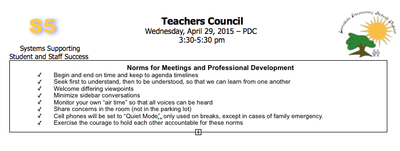Teacher Council Project: School Representative
Project Rationale

The objective of a school representative in Teacher Council was to become an active participant in the Lawndale Elementary School District’s leadership meetings, becoming informed of district goals and changes. As a school representative on a district level, I would have opportunities to participate in developing and sharing the LEAs vision with others. In addition, I would hone my instructional expertise and knowledge regarding the ELD standards as well as discuss district goals for improvement in instruction for our student population which the Teacher Council would address during the school year. Additionally, my role would be to relay district information to the staff, and help guide peer growth in the process as well as personal, professional growth. Participation in Teacher Council would also give me first hand knowledge and experience in organizational and systems leadership on a district level.
Leadership Activities
As a Teacher Council representative, I attended leadership meetings every fourth Wednesday of each month beginning in September. These meetings included all teacher representative from the eight school in our school district. I was able to have discussions with teacher leaders in our district about our district’s vision and goals, especially addressing the needs of EL students and the Multi-tiered System of Supports (MTSS) and Response to Intervention (RTI). Teacher Council members also discussed and gave input on future plans for professional development. During each session, there were opportunities for teachers to share instructional practices that were effective in classrooms. In addition, time was spent in discussion of the Local Control Funding Formula (LCFF) and the Local Control and Accountability Plan (LCAP). I was able to give input on budgetary concerns and help revise a plan to take to the Board Meeting to be held in early June 2015.
After each of the Teacher Council meetings, my role as a school representative, along with two other teacher leaders, was to inform staff of the Teacher Council discussions and developments. Teacher Council meeting format did not change over the course of the year. However, the topics of discussion were affected by the happenings within the district. For example, Lawndale Elementary School District is implementing a new ELD curriculum in the primary grade levels as well as many other new Common Core State Standards aligned curriculum in the coming years. Much of our conversations were spent on these new curricular impacts as well as the RTI and MTSS systems and how we, as a district, were planning on building infrastructure to accommodate all the changes.
CAPEs Connection
CAPE 1 (Developing and Articulating a Vision of Teaching and Learning Consistent with LEA’s Vision): By working on a district level with the Assistant Superintendent of Educational Services allowed me to understand the LEA’s vision and when communicating with my staff regarding district’s vision, I was able to facilitate the school’s vision of teaching and learning in an effective way, especially as it pertained to our new ELD curriculum.
CAPE 5 (Promoting Implementation of K-12 Standards, Pedagogical Skills, Effective Instructional Practices and Student Assessments for Content Instruction): Through Teacher Council, I was able to participate in discussions concerning curriculum and Common Core State Standards. The increase in knowledge about standards and effective instructional practices equipped me to be able to share my knowledge with the staff members at my site. I was able to share effective instruction that I witnessed at Teacher Council meetings with staff members at my school.
CAPE 7 (Understanding of the School and Community Context, Instructional Implications of Cultural/Linguistic, Socioeconomic, and Political Factors): Through participation in Teacher Council, I gained a larger scale understanding of the community as well as the district context. As a school representative, I was able to help the Education Services department understand the mechanism for the RTI system at my school site. As a result, we learned that there needs to be a streamlining of set systems so that each site is providing the students with equitable access to appropriate interventions.
CAPE 8 (Communicating With the School Community about Outcomes Data and Improvement Goals): With respect to communication, I have used staff meetings to communicate with staff regarding Teacher Council activities. For example, I informed staff about the procession of curriculum adoption in our district as well as some of the budget information shared at the Teacher Council meetings.
CAPE 13 (Modeling Life Long Learning and Professional Growth): To better understand MTSS as well as the RTI process, Teacher Council members and I read articles on MTSS as well as Universal Design for Learning. We participated in discussions regarding these topics as well as RTI.
CAPE 14 (Helping Teachers Improve Their Individual Professional Practice Through Professional Growth Activities): During the Teacher Council meetings, teachers have an opportunity to share effective instructional strategies that we have used in our classrooms. Understanding of andragogy, allows me to understand that teachers are most interested in topics that are relevant to their work. For example, I shared an ELD strategy I used for my primary classroom for other Teacher Council members to use.
CAPE 17 (Developing, Implementing, and Monitoring the School’s Budget): As a school representative at the Teacher Council meetings, I gave input regarding the revisions for the 2015-2016 LCAP. The Assistant Superintendent of Educational Services detailed the plans from 2014-2015. I discussed needed additions to the 2015-2016 LCAP, including math coaches and technology.
Reflection
Due to the fact that Teacher Council is a leadership opportunity planned by the district, I was able to learn quite a lot about district’s perspectives on organization and schools. As a school representative, I relayed information I gained from the meetings and participated in quality conversations about district vision and plans new curriculum adoption with staff at my site. The successes were that I learned so much about the inner workings of a district. I feel fortunate in that Lawndale Elementary School District is a small district and that I had an opportunity to work regularly with our Assistant Superintendent, Dr. Hamilton. A challenge I experience was the infrequency of Teacher Council meetings. Realizing that teachers do not have a lot of extra time, I understand that one meeting per month is quite acceptable. However, as a leadership group, it was difficult for me to manage continuity because of the seldomness of the meetings. For next year, I would like to create a small team of interested teachers on-site to have further discussions about topics covered during Teacher Council. Discussions with staff members might allow me to gain a wider perspective of teachers and contribute more effectively to monthly Teacher Council discussions.


